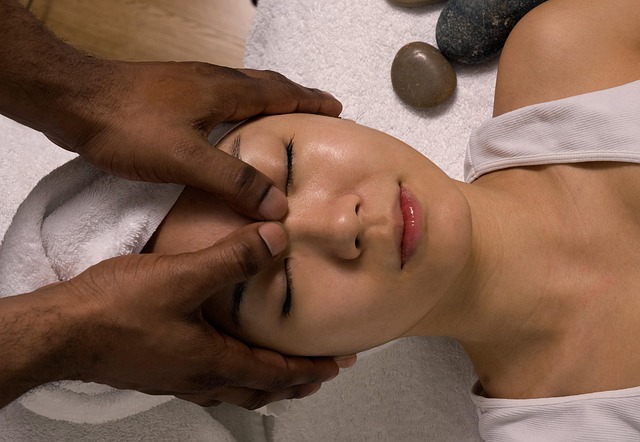Personalized facial treatments, including chemical peels, are key to skin health and beauty. Chemical peels, every 4-6 weeks, improve texture, tone, and stimulate collagen. Skilled estheticians assess individual needs, factoring age, lifestyle, and conditions for tailored treatments like chemical peels to achieve visible improvements over time.
Unsure how often to book that luxurious facial? This guide is your map to achieving radiant skin. We’ll explore the optimal frequency for professional treatments, tailored to your unique complexion needs. Discover the profound benefits of regular facials, from deep cleansing to boosting collagen production. Dive into our discussion on chemical peels—understanding their ideal application intervals and post-treatment care. Prepare to unlock a glowing, healthy complexion with expert advice at your fingertips.
Understanding Your Skin's Needs
Understanding your skin’s unique needs is a crucial step in determining how often to schedule professional facial treatments. Different skin types and conditions require specialized care, and a qualified esthetician can provide valuable insights tailored to your specific concerns. For instance, those with acne-prone skin may benefit from regular deep cleansing facials to unclog pores and reduce inflammation. On the other hand, aging skin might respond well to treatments like chemical peels, which gently exfoliate dead skin cells, stimulate collagen production, and enhance overall texture and tone.
It’s essential to remember that consistency is key when it comes to achieving optimal results from facial treatments. Depending on your skin’s needs and the type of service provided, you may require treatments every 4-6 weeks for maintenance or more frequent sessions for intensive rejuvenation. During consultations, estheticians often consider factors like lifestyle, environmental exposure, and home skincare routines to recommend a personalized schedule that supports your skin’s health and longevity.
Benefits of Regular Facials
Regular facial treatments offer a multitude of benefits for your skin’s health and appearance. One of the most popular and effective procedures is chemical peeling, which involves applying chemicals to the skin to remove the top layer of damaged cells, revealing smoother, brighter, and more even-toned skin beneath. This process not only enhances the texture of your skin but also stimulates collagen production, leading to a rejuvenated look.
Additionally, facials help in deep cleaning, removing impurities, and reducing clogging that can result in acne breakouts. They also provide an opportunity for skincare professionals to identify specific concerns like dryness, aging, or hyperpigmentation, allowing them to tailor treatments with targeted ingredients like antioxidants, hydrators, and retinoids. Regular facials are thus a proactive approach to maintaining skin health, ensuring its long-term radiance, and delaying the signs of aging.
Chemical Peels: Frequency and Care
Chemical peels are a popular professional facial treatment known for their ability to transform skin texture and tone. However, determining the optimal frequency for these treatments is essential to achieving the best results without causing skin sensitivity or damage. Typically, chemical peels are recommended every 4-6 weeks, allowing the skin to heal and regenerate between sessions. This interval ensures that the skin can effectively process the treatment’s benefits while maintaining its barrier function.
Proper care between peels is crucial. Post-treatment, the skin may be red and slightly irritated, so using gentle, hydrating products and avoiding harsh chemicals or direct sun exposure is vital. Additionally, consulting a dermatologist to understand your skin type and specific needs can help tailor the peel frequency and aftercare routine for optimal results.
Personalized Treatment Plans
Personalized treatment plans are a key aspect of achieving optimal skin health and beauty. Every individual’s skin is unique, with varying needs and concerns. That’s why professional facial treatments should be tailored to your specific skin type and issues. A skilled esthetician will assess your skin during your initial consultation, taking into account factors like age, lifestyle, and any existing conditions or medications.
Based on this assessment, they can recommend the most effective treatments, which may include chemical peels to exfoliate and rejuvenate the skin. Chemical peels use a solution of chemicals to remove the upper layers of the skin, stimulating collagen production and improving texture. The frequency and type of peel recommended will depend on your skin’s response and the desired results, ensuring a personalized approach that delivers visible improvements over time.
Regular professional facial treatments, tailored to your skin’s unique needs, can significantly enhance your skincare routine. While the frequency varies based on individual requirements, benefits like deep cleansing, exfoliation (including chemical peels), and rejuvenation are experienced over time. Incorporating facials into your self-care regimen allows for a healthier, more radiant complexion. Remember, consulting a dermatologist to determine the best personalized treatment plan is key, especially when considering treatments like chemical peels.
